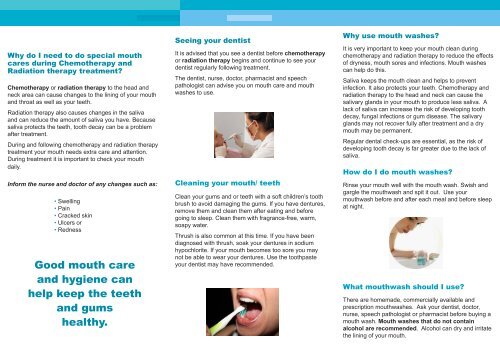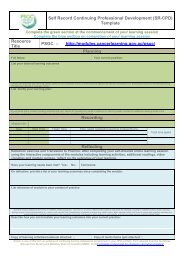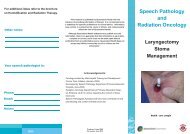Mouth Care for Patients Receiving ... - Cancer Learning
Mouth Care for Patients Receiving ... - Cancer Learning
Mouth Care for Patients Receiving ... - Cancer Learning
You also want an ePaper? Increase the reach of your titles
YUMPU automatically turns print PDFs into web optimized ePapers that Google loves.
Why do I need to do special mouth<br />
cares during Chemotherapy and<br />
Radiation therapy treatment?<br />
Chemotherapy or radiation therapy to the head and<br />
neck area can cause changes to the lining of your mouth<br />
and throat as well as your teeth.<br />
Radiation therapy also causes changes in the saliva<br />
and can reduce the amount of saliva you have. Because<br />
saliva protects the teeth, tooth decay can be a problem<br />
after treatment.<br />
During and following chemotherapy and radiation therapy<br />
treatment your mouth needs extra care and attention.<br />
During treatment it is important to check your mouth<br />
daily.<br />
In<strong>for</strong>m the nurse and doctor of any changes such as:<br />
• Swelling<br />
• Pain<br />
• Cracked skin<br />
• Ulcers or<br />
• Redness<br />
Good mouth care<br />
and hygiene can<br />
help keep the teeth<br />
and gums<br />
healthy.<br />
Seeing your dentist<br />
It is advised that you see a dentist be<strong>for</strong>e chemotherapy<br />
or radiation therapy begins and continue to see your<br />
dentist regularly following treatment.<br />
The dentist, nurse, doctor, pharmacist and speech<br />
pathologist can advise you on mouth care and mouth<br />
washes to use.<br />
Cleaning your mouth/ teeth<br />
Clean your gums and or teeth with a soft children’s tooth<br />
brush to avoid damaging the gums. If you have dentures,<br />
remove them and clean them after eating and be<strong>for</strong>e<br />
going to sleep. Clean them with fragrance-free, warm,<br />
soapy water.<br />
Thrush is also common at this time. If you have been<br />
diagnosed with thrush, soak your dentures in sodium<br />
hypochlorite. If your mouth becomes too sore you may<br />
not be able to wear your dentures. Use the toothpaste<br />
your dentist may have recommended.<br />
Why use mouth washes?<br />
It is very important to keep your mouth clean during<br />
chemotherapy and radiation therapy to reduce the effects<br />
of dryness, mouth sores and infections. <strong>Mouth</strong> washes<br />
can help do this.<br />
Saliva keeps the mouth clean and helps to prevent<br />
infection. It also protects your teeth. Chemotherapy and<br />
radiation therapy to the head and neck can cause the<br />
salivary glands in your mouth to produce less saliva. A<br />
lack of saliva can increase the risk of developing tooth<br />
decay, fungal infections or gum disease. The salivary<br />
glands may not recover fully after treatment and a dry<br />
mouth may be permanent.<br />
Regular dental check-ups are essential, as the risk of<br />
developing tooth decay is far greater due to the lack of<br />
saliva.<br />
How do I do mouth washes?<br />
Rinse your mouth well with the mouth wash. Swish and<br />
gargle the mouthwash and spit it out. Use your<br />
mouthwash be<strong>for</strong>e and after each meal and be<strong>for</strong>e sleep<br />
at night.<br />
What mouthwash should I use?<br />
There are homemade, commercially available and<br />
prescription mouthwashes. Ask your dentist, doctor,<br />
nurse, speech pathologist or pharmacist be<strong>for</strong>e buying a<br />
mouth wash. <strong>Mouth</strong> washes that do not contain<br />
alcohol are recommended. Alcohol can dry and irritate<br />
the lining of your mouth.







